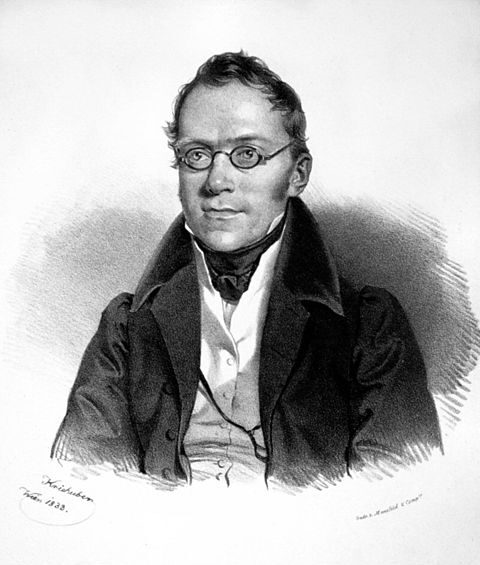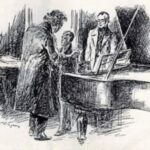This article will introduce one of Beethoven’s talented piano students, Carl Czerny (1791-1857). Czerny became a teacher himself at the age of 15, played in the premieres of Beethoven’s concertos and became a respected friend for life. He composed a vast library of pieces, numbering over 1000 and a large collection of piano study exercises which are still used today. He is best known, however, as one of young Franz Liszt’s main piano teachers.
Interestingly, the tutelage of many outstanding pianists today can be traced back to Czerny and his teaching methods. We can go so far as calling him the father of modern piano technique. Here is an example of this fascinating pedagogical lineage:
celebrated pianist and conductor Daniel Barenboim was taught by Edwin Fischer, who was taught by Martin Krause, who was taught by Franz Liszt! Liszt, in turn, was taught by Czerny.
In this article, we offer a brief summary of the Czerny’s life, a look at his main musical and pedagogical influences and his relationship to Beethoven.
Who was Carl Czerny?
Czerny was born in Vienna to parents of Czech origin. He lived with his parents in adulthood too, he never married, and devoted all his time to his students and in later life to composition. It was not evident that a musician would be able to earn enough to live comfortably even in such a vibrant centre for music as Vienna. His super-productivity (and that he stuck to writing popular music) undoubtably reflects this fact, and his sense of duty towards his parents also, whom he cared for dearly. We also know that Beethoven considered him to be a remarkably talented pianist. He requested that Czerny teach his nephew Karl, and was rather upset when he reported the boy to have little talent.
From 1840 onwards, following over three decades as a full-time music teacher, Czerny turned his attention solely to composition.
His vast productivity extended beyond composition, to include books of piano exercises for dexterity, speed and pianistic technique that are still used to this very day. Born into a musical family, his early influences were J. S. Bach, taught by his father Wenzel Czerny, Muzio Clementi, whose music brought him great joy as a young boy and Johann Nepomuk Hummel, Mozart’s pupil, whose clear and elegant playing style Czerny much admired.
Czerny meets Beethoven
Having started to play piano at just age 3, and composing at age 7, Czerny’s first public performance was given at the age of 9. He played a piano concerto by Mozart. Only a year later, he was introduced to Beethoven by Vaclac Krumholz, a friend of both Beethoven and the Czerny family. Beethoven was impressed by his recital of ‘Pathétique’ and ‘Adeleide’, the composer’s own pieces. He immediately took him on as a piano student, remaining under his tutelage for three full years.
At the age of 15, he premiered Beethoven’s first piano concerto, and at 21 years of age, his fifth, the ‘Emperor’ concerto. Czerny knew all of Beethoven’s works by heart, no scores needed!
As a teenager, he played for Prince Lichnowsky, Beethoven’s patron. The royal would call out opus numbers and Czerny would play the pieces from memory. As a busy teacher himself from the age of 15, Czerny became acquainted with Franz Liszt. They lived in the same street. He gave him lessons free of charge due to his extraordinary talent.
Czerny famously introduced the young Liszt to Beethoven, who was so impressed by his skill that he planted a kiss on his forehead and offered him praise from the heart. Read about their meeting here, an event which Liszt considered his ‘greatest pride’!
Following Beethoven’s footsteps, who often made practical jokes with the names of his friends, here we liszt some of Czerny’s achievements:
he was one of the 50 Viennese composers to write a variation on the Diabelli waltz. In 1842, he published his autobiography. And last but not least, he published editions of Bach and Scarlatti scores, and an interpretation of Beethoven’s piano works. The Beethoven-effect is evident in his compositions, and Czerny passed on these learnt techniques to his students. His approach as a teacher, however, was largely based on that of Muzio Clementi.
Czerny was one of the pallbearers at Beethoven’s funeral.
One final act of generosity
Czerny died at the age of 66, and with no children to inherit his estate, he gifted his fortune to a number of charities. One of these charities supported people who suffered from hearing loss. He also included his housekeeper in his will, and donated his music to the Society of Friends of Music in Vienna (Gesellschaft der Musikfreunde).
Some of Czerny’s most significant works include his eleven piano sonatas, which demonstrate his considerable talent as an artist. Czerny learned from the greats!
German composer Johannes Brahms made the following point to his contemporary, Clara Schumann:
’Czerny’s fingering is particularly worthy for attention. In fact, I think that people today ought to have more respect for this excellent man.’
A.K.



